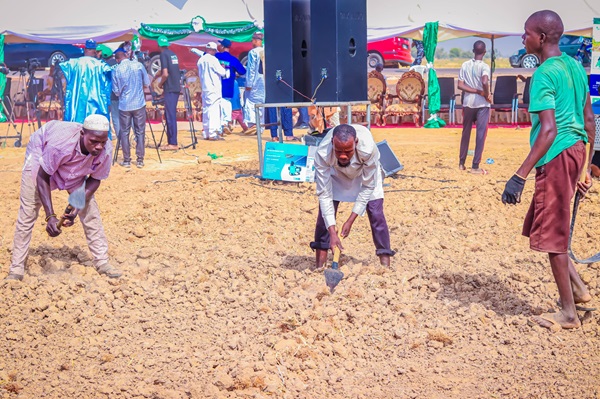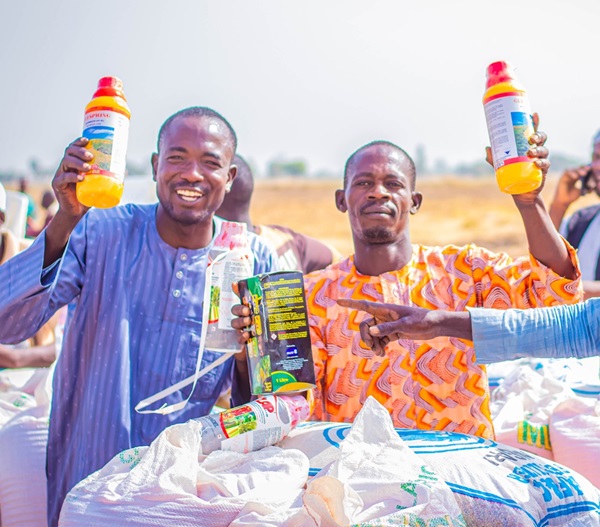
It’s a well-known fact that Nigeria is projected to become the third-largest country globally by 2050, trailing India and China, as estimated by the United Nations. However, with the steady rise in population, the spectre of food insecurity looms large over the nation.
The encroachment of urbanisation has significantly reduced arable land, forcing farmers to grapple with cultivating smaller portions to sustain the growing populace. This challenge is further compounded by climate change, resulting in adverse weather conditions, pest infestations and poor agronomic practices.
To confront these pressing issues, the Federal Government, under the administration of President Bola Tinubu, declared a state of emergency in Nigeria’s food security on July 13, 2023. This declaration has spurred various government interventions aimed at boosting production and addressing loopholes, especially in staple crops like wheat, rice, maize, cassava and others, to fortify food security.
The Wheat Predicament
Wheat stands out as a vital staple in Nigeria’s food system, and the surge in population has fueled an unprecedented demand for it. However, the current local production is estimated to be a mere 10,000 metric tonnes or less, primarily due to limitations in the country’s seed system. Consequently, Nigeria heavily relies on massive wheat importation, leading to significant capital flight and underscoring the urgent need for innovative strategies to feed the burgeoning population.
Government’s Strategic Intervention
At the official flag-off ceremony of the 2023/2024 dry season farming under the National Agricultural Growth Scheme and Agro-Pocket Project (NAGS&AP) in Kadume, Hadejia local government area of Jigawa State, the Minister of Agriculture and Food Security, Sen. Abubakar Kyari disclosed the government’s move to import certified wheat seeds of the Borlaug 100 heat-tolerant variety from Mexico. This initiative aims to enable farmers to produce sufficient certified seeds, aligning with the nation’s target of cultivating between 200,000 to 250,000 hectares of wheat under the National Agricultural Growth Scheme and Agro-pocket project, financed through a loan facility from the African Development Bank (AfDB).
Kyari emphasised the significance of supporting farmers, who are the nation’s primary food producers. He outlined ambitious targets, particularly in wheat production, with plans to support 150,000 to 250,000 farmers, providing a 50 per cent input subsidy to cultivate between 200,000 to 250,000 hectares, targeting an expected yield of 1,250,000 tonnes of wheat. Similar support is earmarked for other staple crops, with the overarching goal of reducing food inflation, curbing Nigeria’s dependence on foreign imports and boosting domestic consumption to achieve agricultural self-sufficiency and stimulate economic growth.
The dry season farming initiative is integral to the National Agricultural Growth Scheme and AgroPocket (NAGS-AP) Project, funded by a $134 million loan facility from the African Development Bank (AfDB). This reflects the administration’s commitment to expanding farmers’ capacity in cultivating key staples such as rice, maize, cassava and wheat across the nation, with an aim to increase crop yield by at least 20 per cent compared to the previous year. The initiative will extend to high-value staples like soybeans and sorghum during the wet season.

Harnessing Technology for Efficiency
Kyari acknowledged the challenges on the path to achieving these ambitious targets but expressed the government’s readiness to tackle them head-on. The innovative use of information and communication technology (ICT) has been instrumental in targeting proven irrigated farm clusters, deploying verified farmer data and mapping farmers to agro-dealer redemption centres. This technological approach ensures transparency and accountability in providing subsidies and additional support services like extension services, insurance and finance.
The government’s commitment to ensuring that support reaches farmers is underscored by the technology-enabled programme. Embracing smart extension services, innovative irrigation techniques, and promoting good agronomic practices (GAP), the government plans to invest significantly in farm infrastructure. The guiding principle is clear: “Farmers First: Farmers Always”.
Agronomic Best Practices
Farmers engaged in wheat cultivation under this program will receive support packages based on agronomic best practices. Agricultural extension master trainers have been trained to guide farmers at clustered irrigation sites. Furthermore, farmers are guaranteed access to improved seeds, including heat-tolerant wheat varieties like Borlaug 100 and Attila. The government plans to progressively invest in irrigation infrastructure projects to optimise water usage and mitigate challenges posed by the dry season.
Expected Returns
Kyari provided insights into the current 2023/24 dry season farming, which will be implemented within a six-month period from November 2023 to April 2024. This initiative will cover clustered irrigation sites across the 37 states of the federation, including the FCT. The eventual wheat products will be off-taken by the Flour Millers Association of Nigeria, which has an annual demand of up to 6,000,000 metric tonnes.
This multi-stakeholder approach involves various sector players, including producer farmers, input producers and distributors, financial institutions, ICT platform providers and other service providers in the areas of machinery and equipment.
In a final call to action, Kyari implored all stakeholders, from farmers to researchers, private sector entities to civil society organisations, to unite and seize the opportunity presented by this 2023 dry season farming initiative. He urged collective efforts to usher in a new era of agricultural prosperity, ensuring a brighter future for Nigeria. Together, stakeholders can transform challenges into opportunities and pave the way for a sustainable and food-secure nation. Let us dare to renew our hope.


